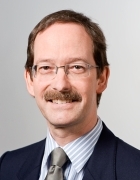
Prof. Dr. Urs Hugentobler
Academic Career and Research Areas
The research focus of Professor Hugentobler (b. 1959) is precision geodetic applications for global satellite navigation systems such as GPS and Galileo. In addition to precise localization for geodynamic applications, this includes precise orbit determination and modeling for navigation satellites and low-orbit satellites, as well as time and frequency transfer. His research tasks also include scientific support for the operation of the Wettzell Geodetic Observatory in collaboration with the German Federal Agency for Cartography and Geodesy.
Professor Hugentobler studied theoretical physics at the University of Bern and received a doctorate in astronomy from the same university in 1997. After working as a postdoctoral researcher at the European Space Agency (ESA), he joined the University of Bern in 1999 as head of the GPS Research Group. He has headed TUM’s Department of Space Geodesy and TUM’s Space Geodesy Research Unit since 2006. He is Secretary General of the Project Geodesy (DGK) of the Bavarian Academy of Science.
Key Publications (all publications)
Štěpánek P, Hugentobler U, Buday M, Filler V: "Estimation of the Length of Day (LOD) from DORIS observations". Advances in Space Research. 2018; 62(2): 370-382.
AbstractHugentobler U, Montenbruck O: "Satellite Orbits and Attitude". In: Handbook of Global Navigation Satellite Systems. Editor: Teunissen P, Montenbruck O. Springer, 2017: 59-90.
AbstractMontenbruck O, Steigenberger P, Hugentobler U: "Enhanced solar radiation pressure modeling for Galileo satellites". Journal of Geodesy. 2015; 89(3): 283-297.
AbstractRodriguez-Solano C, Hugentobler U, Steigenberger P, Bloßfeld M, Fritsche M: "Reducing the draconitic errors in GNSS geodetic products". Journal of Geodesy. 2014; 88(6): 559-574.
AbstractMalservisi R, Hugentobler U, Wonnacott R, Hackl M: "How rigid is a rigid plate? Geodetic constraint from the TrigNet CGPS network, South Africa". Geophysical Journal International. 2013; 192(3): 918-928.
AbstractIf you wish your profile to be changed or updated please contact Franz Langer.